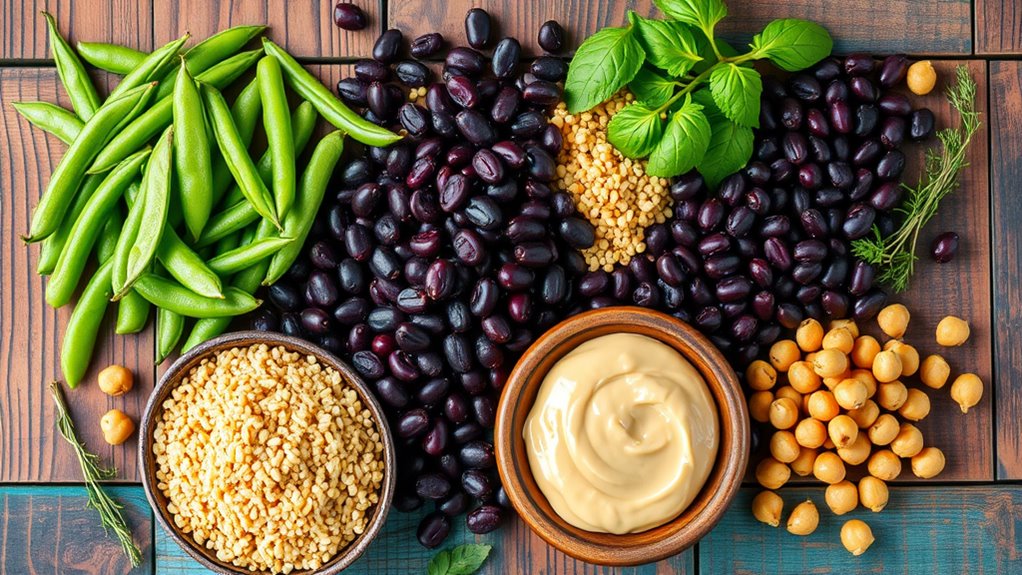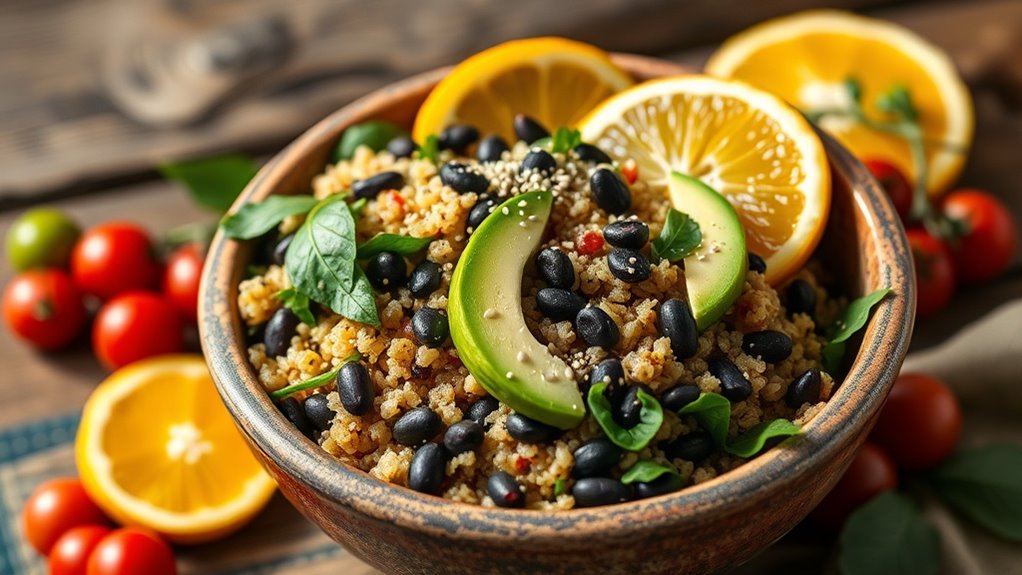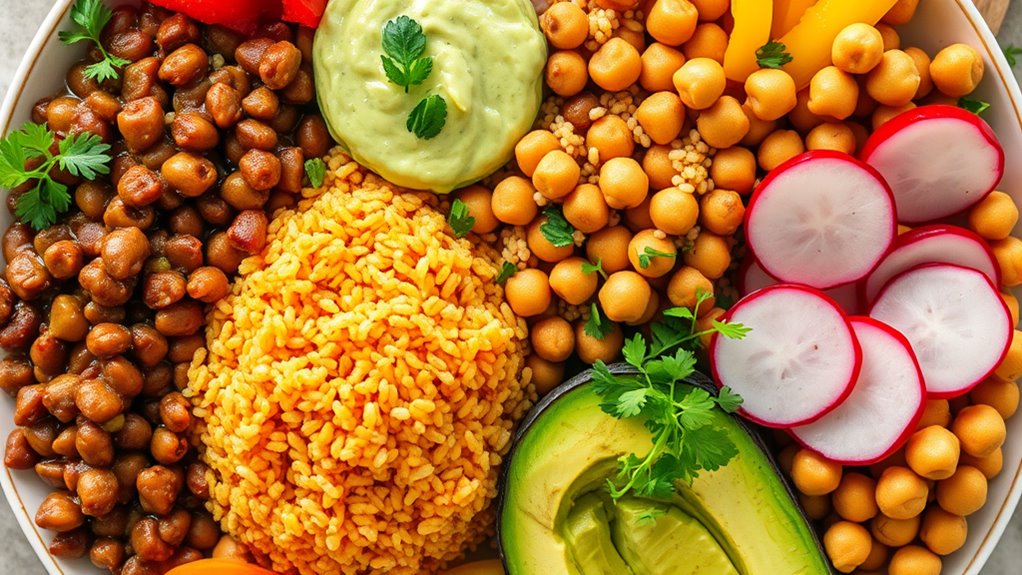Plant-Based Proteins That Will Surprise You!
Have you ever considered that some of the best sources of protein might be hiding in your pantry? Plant-based proteins offer unexpected nutritional benefits and versatility that can elevate your meals. From the green power of edamame to the unique fermentation process of tempeh, these options are worth your attention. Discover how these surprising ingredients can enhance your diet and support your health.
Key Takeaways
- Edamame is a complete plant-based protein, offering 17 grams of protein per cup and packed with essential nutrients like vitamin K and magnesium.
- Quinoa is not only a complete protein but also high in fiber and has a lower environmental impact compared to animal proteins.
- Tempeh offers all essential amino acids and benefits gut health through fermentation, making it a versatile meat substitute in various dishes.
- Spirulina contains 60-70% protein by weight and is full of antioxidants, particularly effective at reducing inflammation.
- Chia seeds provide protein, fiber, and omega-3 fatty acids, making them a powerhouse for heart and digestive health in easy-to-use forms.
Edamame: The Green Powerhouse
Edamame, the vibrant green soybeans, pack a nutritional punch that makes them a popular choice among health enthusiasts. You might be surprised to learn that a single cup of edamame contains around 17 grams of protein.
These surprise proteins offer a complete amino acid profile, making them an exceptional choice for plant-based diets. When you snack on edamame, you’re also getting essential vitamins and minerals, such as vitamin K, folate, and magnesium, all contributing to your overall health. Additionally, plant-based proteins are becoming increasingly recognized for their role in promoting a healthier lifestyle.
You can enjoy them steamed or roasted, tossed into salads or stir-fries. Incorporating edamame into your meals not only enhances flavor but also elevates your protein intake, transforming your culinary creations into nutritious powerhouses that nourish your body and fuel your active lifestyle.
Quinoa: A Complete Protein Grain
When it comes to plant-based proteins, quinoa stands out as a remarkable grain that many people appreciate for its versatility and nutritional benefits. This ancient superfood isn’t just a trend; it’s a complete protein, meaning it contains all nine essential amino acids your body needs. With its delightful nutty flavor and fluffy texture, quinoa adapts well to a variety of dishes—from salads to stir-fries. It’s also packed with fiber, vitamins, and minerals, making it a fantastic choice for those looking to elevate their meals. By incorporating quinoa into your diet, you’re not only enhancing your protein intake but also embracing a wholesome, nutrient-rich food. Quinoa’s environmental impact is relatively low compared to animal proteins, making it a superior meat alternative for those conscious of their ecological footprint. Discover how this grain can elevate your culinary creations while boosting your health.
Chia Seeds: Tiny But Mighty
Chia seeds, often hailed as a superfood, pack a powerful nutritional punch in their tiny size.
These tiny black seeds are nutritional powerhouses, rich in plant-based protein, fiber, and essential omega-3 fatty acids. When you include chia seeds in your meals, you’re not just boosting protein intake, but also enhancing digestive health and heart wellness.
They absorb water and expand, creating a satisfying gel-like texture that can elevate your smoothies, puddings, or salads. Incorporating them into your diet is simple; just a couple of tablespoons can make a significant difference. Additionally, these seeds are a great source of unique plant-based proteins, making them an excellent choice for vegan diets.
Nutritional Yeast: The Cheesy Vegan Secret
As you explore the world of plant-based proteins, you might stumble upon nutritional yeast, a favorite among vegans and health enthusiasts alike.
This versatile ingredient not only adds a creamy, cheesy flavor to your dishes but also packs a nutritional punch. Here’s why you’ll want to keep it stocked in your pantry:
- Protein-rich: 8 grams per 2 tablespoons!
- B vitamins galore: Especially B12, essential for energy and brain function.
- Savoriness that satisfies: It transforms ordinary meals into taste sensations.
- Low calorie: An indulgent taste without the guilt.
Nutritional yeast serves as a powerful tool in your plant-based arsenal, enhancing flavors while ensuring you meet your nutritional needs. Additionally, it can be used in a variety of dishes, making it a versatile ingredient that’s perfect for countless recipes.
Embrace this cheesy vegan secret to elevate your culinary creations!
Spirulina: The Superfood Algae
Spirulina, often hailed as a superfood, boasts an impressive nutritional profile that’s hard to ignore. This blue-green algae packs a potent punch of protein, containing about 60-70% protein by weight. Not only is it a complete protein, but it also provides essential amino acids, making it a fantastic choice for vegans and vegetarians.
Beyond protein, spirulina is rich in antioxidants, particularly phycocyanin, which can reduce inflammation. Plus, it delivers vitamins B1, B2, B3, copper, and iron—all vital for peak health. Unconventional protein sources have emerged in various forms, demonstrating that plant-based proteins can be both diverse and delicious.
When you include spirulina in your diet, whether in smoothies, powders, or capsules, you’re elevating your nutrient intake greatly. Embrace this nutrient-dense superfood and transform your meals into powerhouse offerings that support your health goals with ease.
Peanut Butter: More Than Just a Spread
Peanut butter isn’t just for your morning toast; it’s packed with nutritional benefits that can support your health.
You can use it in a variety of dishes, from smoothies to savory sauces, making it a versatile ingredient in your kitchen.
Plus, it’s a sustainable protein source, helping you make eco-friendly choices while satisfying your hunger.
Nutritional Benefits of Peanut Butter
Nutritious and versatile, peanut butter is more than just a tasty spread; it’s a powerhouse of health benefits. Including it in your diet can support your wellness goals in surprising ways:
-
Protein-rich: Each serving offers a hefty dose of plant-based protein, fueling your muscles.
-
Heart-healthy fats: It’s packed with monounsaturated fats that promote cardiovascular health.
-
Vitamins and minerals: Peanut butter provides essential nutrients like vitamin E, magnesium, and potassium, enhancing overall well-being.
-
Antioxidant properties: It contains resveratrol, which combats oxidative stress, helping to protect your body.
Embrace the nutritional advantages of peanut butter and elevate your meals. It’s not just a treat; it’s a smart choice for a balanced, healthier lifestyle.
Versatile Cooking Ingredient
A jar of peanut butter can transform your cooking in ways you mightn’t expect. Beyond spreading on bread, it’s a versatile ingredient that enhances both savory and sweet dishes.
Use it to create a rich sauce for stir-fries, combining it with soy sauce, ginger, and garlic for a mouthwatering finish. In baking, it adds moisture and depth to cookies and brownies, yielding a unique flavor profile you’ll love.
For smoothies, it’ll provide creaminess and a protein boost, ensuring you stay energized. You can even whip up peanut butter-based salad dressings, elevating greens to new culinary heights.
Don’t limit yourself—let this humble spread inspire your kitchen creativity and explore its full potential in your cooking repertoire.
Sustainable Protein Source
While many sources of protein come with significant environmental costs, peanut butter stands out as a sustainable choice that benefits both your diet and the planet.
This creamy delight isn’t just a tasty spread; it’s packed with nutrients and has a lower carbon footprint than many animal-based proteins.
Consider these compelling reasons to make peanut butter a staple in your kitchen:
-
Rich in Protein: A satisfying source to fuel your muscle growth and recovery.
-
Nutrient Dense: Contains healthy fats, vitamins, and minerals that support overall health.
-
Low Water Usage: Grows with far less water compared to livestock farming.
-
Versatile: Easily incorporated into various recipes, from smoothies to savory dishes.
Embrace this eco-friendly protein powerhouse and elevate your meals while caring for the Earth.
Tempeh: The Fermented Protein Pack
If you’re looking for a nutritious addition to your meals, tempeh is a fantastic option.
This fermented protein pack not only brings numerous health benefits but also offers a variety of culinary possibilities.
Let’s explore how its fermentation process enhances both flavor and nutrition.
Nutritional Powerhouse Benefits
Tempeh packs a powerful nutritional punch, making it an excellent choice for those looking to boost their protein intake. Not only does it provide a robust source of protein, but it also offers a host of additional benefits that can elevate your overall health.
Here’s why you’ll love incorporating tempeh into your diet:
- Contains all essential amino acids for complete nutrition.
- Rich in fiber, aiding in digestion and promoting gut health.
- Loaded with vitamins and minerals, including B vitamins and calcium.
- Fermented, enhancing your gut flora and overall microbiome health.
With its unique profile, tempeh can easily become your go-to protein source that transforms your meals into nutritional powerhouses.
Embrace its benefits and elevate your plant-based lifestyle!
Culinary Versatility Options
Incorporating tempeh into your meals opens up a world of culinary possibilities. This versatile protein is a blank canvas, ready to absorb bold flavors.
Slice it thin for stir-fries, crumble it for tacos, or marinate and grill it for a smoky barbecue experience. You can also blend tempeh into hearty soups or use it as a steak substitute in classic dishes.
Its nutty texture allows for creative pairings; try it with robust spices, fresh herbs, or tangy sauces. Whether you’re experimenting with Asian-inspired recipes or crafting comforting Western dishes, tempeh adapts effortlessly.
Fermentation Process Insights
While many proteins come from straightforward processing, tempeh boasts a unique fermentation process that enhances its nutritional profile and flavor.
This transformative journey not only elevates your dishes but also enriches your body with essential nutrients.
Here’s what makes tempeh special:
-
Increased Digestibility: Fermentation breaks down complex nutrients, making them easier to absorb.
-
Enhanced Flavor: The process imparts a rich, nutty taste that can elevate meals.
-
Probiotic Benefits: It supports gut health, promoting a balanced microbiome.
-
Sustainable Protein Source: Tempeh is made from soybeans, a plant-based powerhouse that’s eco-friendly.
Embrace tempeh in your culinary repertoire and savor its rich benefits.
Mastering this fermented protein will surely impress your palate and enhance your health.
Lentils: The Unsung Hero of Legumes
Although often overshadowed by other legumes, lentils deserve recognition for their impressive nutritional profile and versatility in the kitchen. Packed with protein, fiber, and essential vitamins, they’re a powerhouse for plant-based diets.
You’ll find them rich in iron, folate, and various antioxidants, promoting overall health and well-being. Versatile and quick to cook, lentils adapt beautifully to soups, salads, and stews, making them a staple in culinary exploration. In addition to their nutritional benefits, lentils are also a sustainable protein source, contributing positively to environmental health.
You can even use them in veggie burgers or purees for added depth. Experiment with different varieties like black, green, or red; each lends a unique flavor and texture.
Sunflower Seeds: Crunchy and Nutritious
Sunflower seeds aren’t just a crunchy snack; they pack a powerful nutritional punch.
You’ll discover their diverse culinary uses and how to incorporate them into your meals.
Plus, let’s explore the impressive health benefits that make these tiny seeds a big deal.
Nutritional Profile Overview
If you’re looking for a nutritious snack that’s packed with flavor, sunflower seeds might be just what you need. These tiny powerhouses offer a remarkable nutritional profile that supports your health goals. With a hearty dose of plant-based protein, they’re not just tasty; they’re also a smart choice.
-
High in vitamin E, promoting skin health and antioxidant protection
-
Packed with magnesium, essential for muscle function and energy production
-
Rich in healthy fats, supporting heart health and reducing inflammation
-
Loaded with fiber, aiding digestion and promoting satiety
Incorporating sunflower seeds into your diet can boost your overall nutrient intake and keep your energy levels stable.
You’ll not only satisfy your cravings but also nourish your body simultaneously.
Culinary Uses and Recipes
When you’re looking to add a delicious crunch to your meals, sunflower seeds are incredibly versatile and easy to incorporate. Toss them into salads for an added texture or sprinkle them on top of roasted vegetables to elevate their flavor.
You can also blend sunflower seeds into pestos or dips, creating a creamy, nutty delight that pairs perfectly with crackers or fresh veggies. For breakfast, add them to your smoothies or oatmeal for an extra protein boost.
If you’re feeling adventurous, try making homemade energy bars by combining sunflower seeds with oats and natural sweeteners; they’re satisfying and perfect for snacking.
Whichever way you choose, sunflower seeds can transform your dishes into something truly remarkable.
Health Benefits Explained
Packed with essential nutrients, sunflower seeds offer impressive health benefits that make them a fantastic addition to your diet.
You’ll love how these crunchy delights can elevate your wellness game.
-
Rich in healthy fats: They help reduce bad cholesterol levels.
-
High in antioxidants: They combat oxidative stress and inflammation.
-
Source of vitamin E: This promotes healthy skin and immune function.
-
Packed with protein: They support muscle repair and growth.
Oats: A Surprising Protein Source
Although oats are often celebrated for their heart-healthy benefits and versatility, they also deserve recognition as a surprising source of plant-based protein. One cup of cooked oats provides about 6 grams of protein, making it an ideal base for breakfast or snacks. Oats contain essential amino acids and fiber, which together promote satiety and muscle recovery. Incorporating oats into energizing high-protein recipes can help fulfill your daily protein needs while enjoying their naturally sweet flavor.
| Nutritional Component | Amount per Cup | Benefits |
|---|---|---|
| Protein | 6g | Supports muscle growth |
| Fiber | 4g | Aids digestion |
| Iron | 2mg | Boosts energy levels |
Incorporate oats into smoothies, cookies, or savory dishes, and you’ll boost your protein intake while enjoying their naturally sweet flavor.





